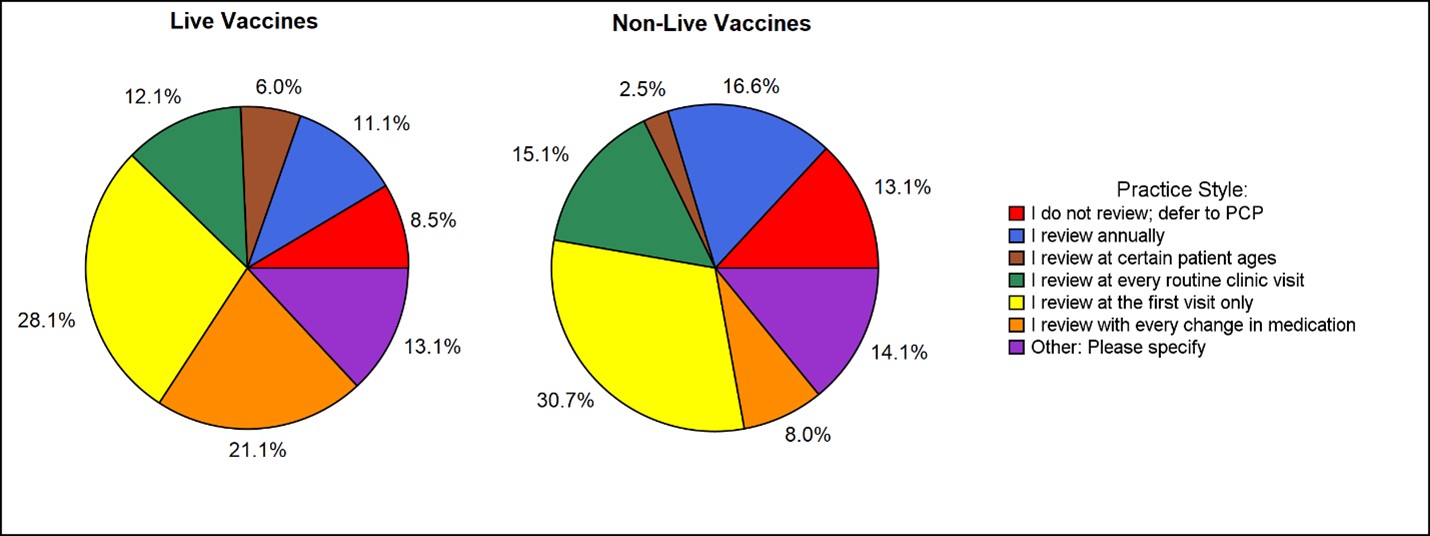Session Information
Date: Tuesday, November 14, 2023
Title: (2039–2060) Pediatric Rheumatology – Clinical Poster III: Potpourri
Session Type: Poster Session C
Session Time: 9:00AM-11:00AM
Background/Purpose: Immunocompromised children (ICC), including children with rheumatic diseases receiving immunosuppressive therapies (IST) are at increased risk of morbidity from vaccine-preventable infections. The 2022 American College of Rheumatology (ACR) Vaccination Guidelines emphasize the need to vaccinate ICC and minimize missed opportunities for immunizations. Children with rheumatic diseases receiving IST are eligible to receive inactivated vaccines, however vaccination rates remain unacceptably low in these children. The CARRA Vaccination Workgroup (WG) surveyed North American pediatric rheumatologists about their vaccination practices when caring for children receiving IST.
Methods: The CARRA Vaccination WG developed and electronically distributed a REDCap survey to CARRA member healthcare professionals from March-May 2022.
Results: The survey was completed by 219 pediatric rheumatology providers with a response rate of 60% (74% attendings, 21% fellows). More than 90% of rheumatology providers reviewed their patients’ vaccinations, with most reviewing live (28%) and non-live vaccines (31%) at the first visit only (Figure 1). Several providers used comments to clarify their vaccine review practices, most commonly reporting reviewing influenza and COVID vaccines alone, or in combination with other vaccines. Thirty-nine percent of providers reviewed conjugate (PCV-13) and polysaccharide (PPSV 23) pneumococcal vaccine status, especially in patients with childhood-onset SLE (c-SLE). Twenty-six percent reviewed vaccination status based on initiation or type of IST, and age, whereas half of respondents reported used a disease-specific review approach, focused primarily on c-SLE (89%), followed by systemic vasculitis (42%), juvenile dermatomyositis (39%) and juvenile idiopathic arthritis (28%). Forty-two percent of providers reported medication-specific review, including prior to Rituximab initiation (57%), initiation of any IST (20%), IVIG (10%), or cyclophosphamide (7%). There was also variability in communication about vaccines between rheumatology provider and primary care pediatricians (PCPs), with 41% of rheumatologists indicating they did not contact the PCP, 22% contacting the PCP regarding live vaccines only, 30% for live and non-live vaccines, 19% for pneumococcal vaccines, and 18% for ‘Other’, of which more than half of those who wrote narrative comments stated vaccine recommendations were included in the clinic note to the PCP.
Conclusion: This survey demonstrated significant variability in rheumatology provider approaches to vaccinations in ICC. While 90% of rheumatology providers reviewed vaccinations, less than half reviewed seasonal vaccines or pneumococcal vaccines, and those who did, mainly reviewed vaccinations in the setting of specific diseases, specific medications, or new patient visits. Our results highlight opportunities for improvement in the care of ICC by increasing awareness of the need for vaccination against vaccine-preventable infections. This study underscores the need for standardized vaccination practices in ICC and improved communication between providers to maximize immunization opportunities for ICC.
To cite this abstract in AMA style:
De Souza R, Heshin Bekenstein M, Rutstein B, Schletzbaum M, Singer N, Kohlheim M, del gaizo v, Wise K, Nikahd M, Brock G, Sadun R, Ardura M, Sivaraman V, The CARRA Registry Investgators F. Variability in Vaccination Practices in Children with Rheumatic Diseases: Results of a Rheumatology Provider Childhood Arthritis and Rheumatology Research Alliance (CARRA)-wide Survey [abstract]. Arthritis Rheumatol. 2023; 75 (suppl 9). https://acrabstracts.org/abstract/variability-in-vaccination-practices-in-children-with-rheumatic-diseases-results-of-a-rheumatology-provider-childhood-arthritis-and-rheumatology-research-alliance-carra-wide-survey/. Accessed .« Back to ACR Convergence 2023
ACR Meeting Abstracts - https://acrabstracts.org/abstract/variability-in-vaccination-practices-in-children-with-rheumatic-diseases-results-of-a-rheumatology-provider-childhood-arthritis-and-rheumatology-research-alliance-carra-wide-survey/

